

In this second part of the guide, I'm going to cover the political structures of Crusader Kings II. These are an essential part of the game, at every level, and you'll have to work to benefit from good Laws and Factions while also trying to defuse and change the bad ones. Also bear in mind that these are meant to be read in order, so this guide assumes you've done Part One and are playing as Aquitaine.
And remember, here's the full list of guides:
Part One: Introduction and Interface
Part Two: Laws and Factions
Part Three: Diplomacy and War
Part Four: Relationships and Marriages
Part Five: Long-Term Planning
Just The Factions
As you let time pass, you'll quickly have messages pop up, probably well before the situation in England can be resolved. If you have the “Legacy Of Rome” expansion, then you have Factions enabled. Those are likely to be the first and most important pop-ups. France is a big, powerful kingdom, and child rulers are by definition weak, so the nobles are going to be restless and constantly scheming. Factions are the public face of those schemes.
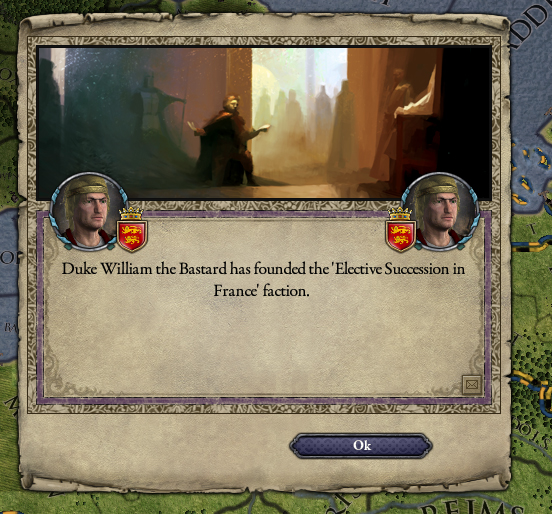
In my game, the first faction I see is that Duke William (busy guy) wants to institute Elective Succession in France. Elections allow nobles who aren't the king's family to take his crown, which includes potentially you, so this may be worth supporting. To support a faction, click on the Faction button, second from the right on the top left row. I can't tell what the icon is—looks like hand in front of a pile of...somethings. It's to the left of the cross and to the right of the dagger-and-letter.

On the Factions screen, the top half shows Factions in your duchy, and the bottom half shows Factions in your kingdom. That's where William's Elective Monarchy Faction is. Click the little arrow to its right, and you can join that Faction. Now, when William decides to pull the trigger on manifesting the faction, you'll automatically be joining him, and the King of France will decide if he wants to fight everyone in the Faction or accede to their wills. But what is Elective Succession anyway?
Laws
There are a handful of Laws that determine how the liege-vassal relationships and succession of each realm of the game work, and they exist at each level of the feudal hierarchy. That sounds complicated, but in practice it's pretty simple—just keep in mind that the Laws which you've put into place as the Duke of Aquitaine won't be in place if you ever change your primary title. That can be a nasty surprise.
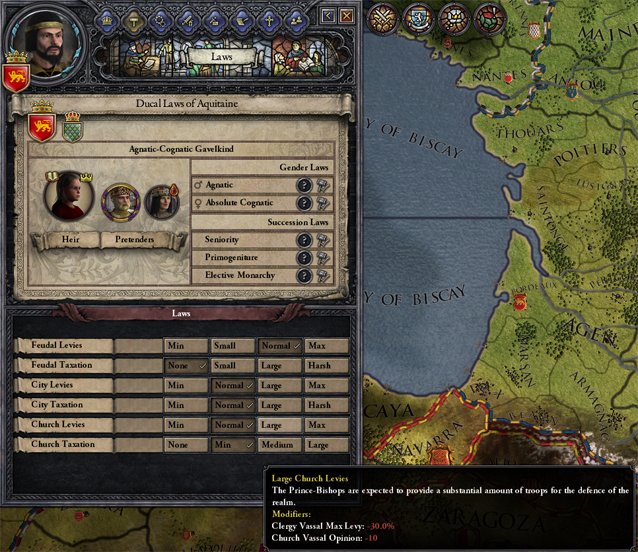
Let's take a quick look at these Laws and what's possible with them. Click the gavel button on the top left menu bar, and you'll be taken to the Laws for the Duchy of Aquitaine. Along the bottom of the Laws screen you'll see a set of different options for the amount of taxes and troop levies you can expect from your vassals of the three types—cities, castles, and churches. Hover your mouse over and you'll see that this can make those vassals like you a little less, but hey, you're getting their gold and troops. Pick one of them, like Large Church Levies and advance it to the next highest level, and your vassals will have the chance to vote on it—we'll see the results of that soon.
The part of the Laws menu above that is far more important. These are your demense's succession laws. They're divided into two parts—gender and distribution. The gender laws are relatively unimportant; I've rarely ever needed to change these (Agnatic means only men inherit, Absolute Cognatic mean women and men inherit on an equal basis, Agnatic-Cognatic means women will only inherit if there isn't a male heir). On the other hand, the successor/distribution laws are perhaps the most critical component of Crusader Kings II. Here's what they do:
Gavelkind: Land is split relatively equally between all children, with the oldest child being your heir and getting the largest portion if there is one. This is common in Western Europe in 1066, and extremely bad for players (unless you're in Scandinavia or Russia, where quick expansion is possible). You can survive one or two successions with it, but it often means you start over from scratch with each successive ruler.
Seniority: Seniority gives the demense to the oldest legally viable member of the family. This is a very rare succession law, which is good, because it's absolutely terrible for the player given many of the game's other rules. You'll bounce from powerful rulers to pathetic rulers every couple of years, which will eventually get you a weak ruler with no base and a bunch of enemies.
Election: The top nobles of a realm vote for their choice of heir. This is a good, solid choice for the player because, as the ruler, you'll have a major voting advantage and probably be able to choose the heir you want, while your vassals are often happy because they're an important part of the process. However, it is occasionally possible, especially with surprise deaths, to find yourself with a ruler you really, really don't want—and that can potentially end the game. (Election can also be annoying to play with in larger kingdoms and empires, as you'll get messages every time anyone changes their vote).
Primogeniture: The oldest legal child inherits everything. This is the best option for a powerful ruler, as it means his or her heir will keep everything and have the chance to improve it. Younger children don't like it, so it's not perfect, but it and Election are the only two good options.
Why is this important? Well, look at this:
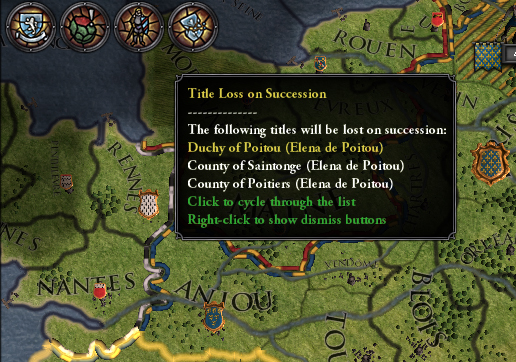
This is one of the most important notification icons in the game—it means that when your ruler dies, you're going to lose land. It's a few years later in the Aquitaine game, and Duke Guilhem has two daughters. Under Gavelkind, he's obligated to split his possessions roughly equally. Since he has multiple duchies, each daughter gets at least one. Since they would both become Duchesses of equal rank, they would no longer be vassals of each other. For you, the player, this means that your possessions of three duchies, dominating southern France, would become just two duchies. You'd also lose a few counties from your demense.
There are only a few ways around this: the daughters can die (a process that can occasionally be hurried by the player). Duke Guilhem could have one son, no more, who would then inherit everything thanks to the gender laws. Or he could change the laws—but that's difficult to do.
Hover the mouse over the question marks and check marks in the Laws screen, and you'll see what they do, and how they can be changed. Changing the strongest Laws is only possible when your demense is stable, when you've ruled for at least 10 years, if you haven't changed the major Laws before as your current ruler. A lot can go wrong here—and the most dramatic events you'll have to deal with involve getting into position so that your succession Laws don't ruin your family.
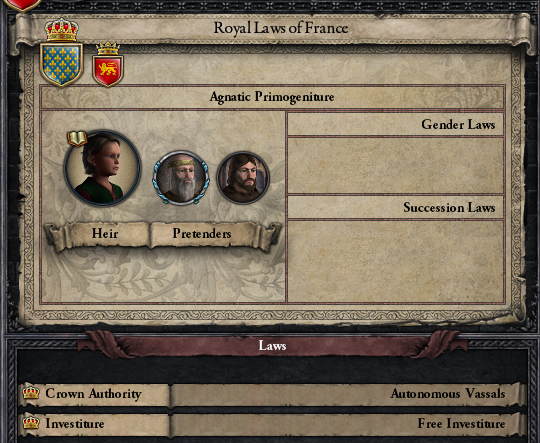
One last thing to note about Laws. On the top left of the screen, there are two shields with coats of arms. The red one is you as your duchy, Aquitaine, the blue is for your kingdom, France. You cannot change the Laws of France directly, but they can affect you. Click the blue shield, and note the “Crown Authority.” This is a scale from Autonomous Vassals, what it's at currently, to a high authority.
Lower authority means vassals like you can declare war on whoever you want, outside your kingdom or against your fellow French dukes if need be. Higher authority reins that in. Rulers will always be trying to raise the authority; vassals will dislike that and always be trying to lower it. Crown Authority counts as a major Law change, so you can't change both it and a succession Law with the same ruler. This is one of the core tensions of Crusader Kings II.
(Investiture lets you appoint your own bishops, versus the Pope doing it. While important in the Middle Ages, it seems easily ignorable in the game.)
A Courier Has Arrived
Close out of the Laws section and unpause the game. Several messages should show up over time. Important messages will pop up in the middle of the screen, pausing the game. Less important messages show up on the top right—you should see little letters with numbers under them. If you just changed a law, you'll see your vassals start to vote for that.
As you learn the game, you'll learn which messages are most important. Right-clicking on the top of the messages box will allow you to set filters for which messages you receive, which you may want to do eventually. Or not—I found the default message settings to be useful in most of my first games.
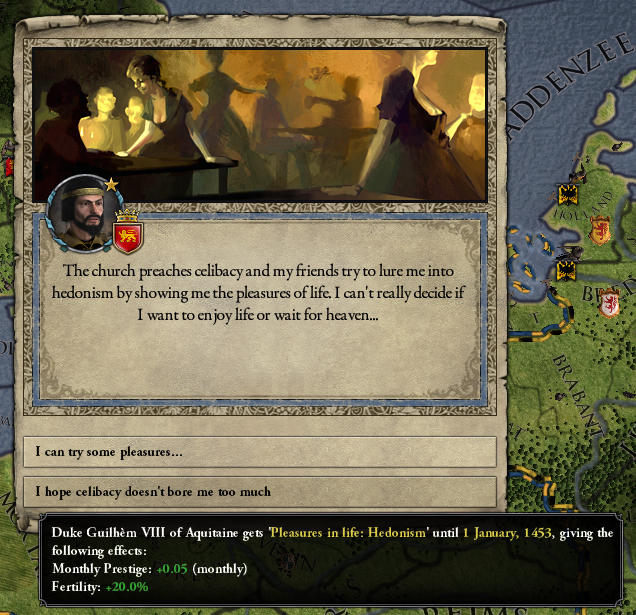
Sometimes you'll get little character choices, like this one about whether your character should embrace Celibacy or Hedonism. These exist primarily to add flavor, so make whichever choice you want. Depending on how you're playing, there will be times when one choice is clearly superior to the other, but understanding why tends to come with time. Don't worry too much about the numerical mechanics of the choices at first—most everything should be pretty self-explanatory, or at least interesting to role-play with.
You'll also get pop-ups where one of your nobles says he'll be a better member of your council than your current appointee. The people making this petition are always correct in terms of their stats, so you should generally accept these. (Occasionally there are political considerations that would lead you to reject them, but those are rare enough that you'll probably be fluent enough in Crusader Kings II to recognize them by the time they pop up.)
Scheming
The most dangerous pop-up of all is the one that says that a new faction in your duchy has arisen, particularly if it's Independence or Someone Not You For Aquitaine. If that happens, it's worth checking out the Factions screen again. Here we have a count who's decided that he would prefer Beatriz, your sister, as the Duchess of Aquitaine. Even though right now the supporters of this move only have 36% of your total troop strength, as the screen shows, we're still going to try to nip this in the bud.

First, let's find out where it is. Click on the Leader's shield to get taken to his home county. Next, open your Council tab. Go to your Spymaster, and choose “Scheme.” Then drop him on your Faction Leader's home county. Scheming Spymasters attempt to dissuade vassals from their goals.
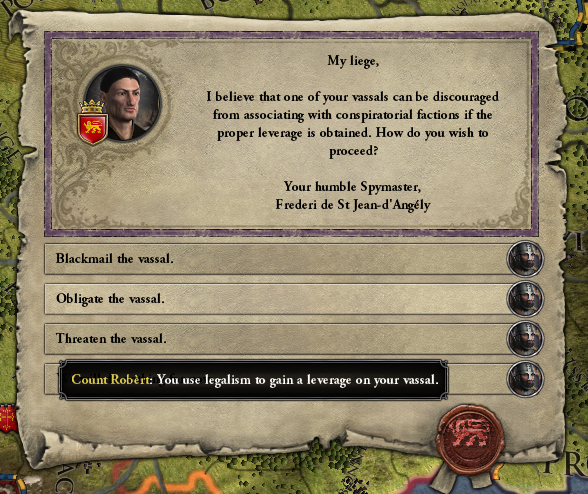
Eventually this screen will pop up, and you'll have the chance to dissuade your vassal from the plot. I haven't found a difference in these forms yet. The critical factor in all of them seems to be how much your vassal likes you. This guy doesn't quite like you enough, and he's the Leader of the faction, so he'll probably just get pissed off. It's generally more successful to use Scheme on vassals who like you more and who have merely joined the Faction instead of Faction leaders.
Decadence
Let's take a brief diversion here to discuss the Islam-specific mechanic Decadence. so save your game, then Resign back to the main menu. Playing as a Muslim ruler includes one critical game mechanic that changes the game dramatically, so it's worth taking a moment to explain it.
Start a new game in 1066, change the map to Duchies again, and go to the far, far, southeast part of the map, and choose the Beylerbey of Hormuz. Now take a look at the top right part of the screen and you'll see that next to your money, you have a percentage rating for Decadence. It's low right now, at 2%, but hover over it, and you can see that it's steadily increasing—at 1.87% a month!
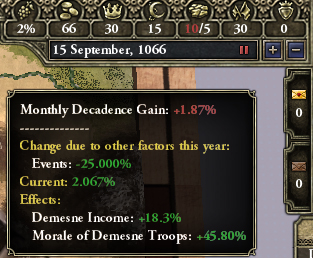
Decadence is an anchor on your abilities as a ruler. It decreases the amount of gold you receive from taxes, and also decreases your armies' morale. It exists because Crusader Kings II accurately models the relative wealth of the Islamic kingdoms in the Middle East, but that wealth can't be so much that they can overwhelm their Christian counterparts. It's also historically true that the more powerful the Muslim rulers, the more detached and inefficient they tended to be from governing. I think it's a marvelously clever mechanic.
Here's the core decadence problem: the main thing that makes it go up is unlanded, adult close family members. Click on your Beylerbey's character tab, and you'll see that he has three unlanded sons. But also, if you hover over your prestige, you'll note that that takes a hit if you have fewer than three wives. More wives generally means more sons, and more sons means more decadence.
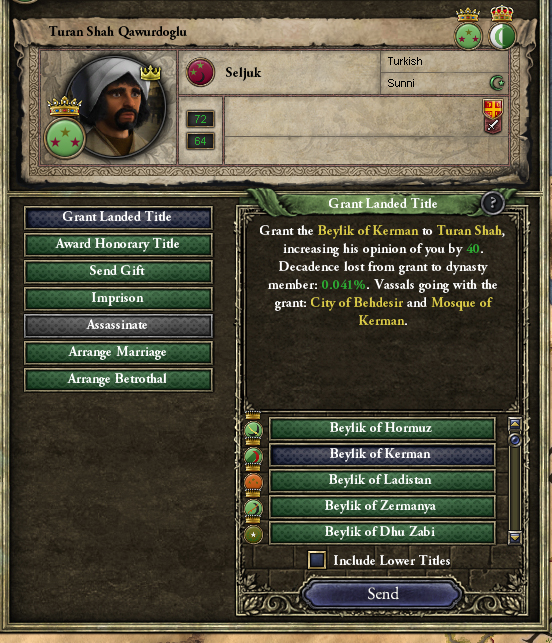
2% is extremely low decadence, so if we were playing a full game here, we wouldn't need to worry about it. Once decadence gets above 25% or so, it becomes a real problem. Still, because we have unlanded sons, we can see how the process works. Open diplomacy with one of them, click on Grant Landed Title, and select one of your Beyliks. See how it says you'll lower Decadence by 0.041%? That's the most convenient way to lower it. 0.041% isn't huge—it's a percentage of the total Decadence percent. But it will be. (You can also lower or raise Decadence through certain events or Decisions.)
This makes playing as an Islamic leader a more dynamic experience—you're either constantly trying to grow to make land for your sons, or you're trying to kill them. On the other hand, it lessens entrenched rivalries and more meticulous growth, which make playing as a Christian kingdom so satisfying in the long term. Give both a try!
Conclusion
You now should have enough background to understand how Crusader Kings II works politically. In the next three installments, I'll discuss Diplomacy and War, the Relationship system, and Long-Term Planning.
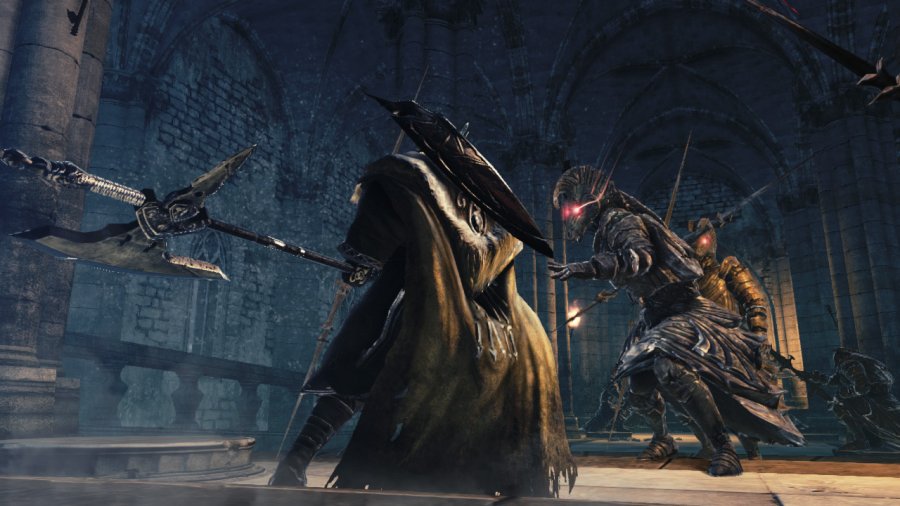



 Fallout 4 Build a Signal Interceptor (DIY) - Molecular Level
Fallout 4 Build a Signal Interceptor (DIY) - Molecular Level Life is Strange Episode 5 All Optional Photo Locations
Life is Strange Episode 5 All Optional Photo Locations Best Tower Defense Games of All Time
Best Tower Defense Games of All Time How to reduce the Radiation Damage(Red health) in Fallout Shelter
How to reduce the Radiation Damage(Red health) in Fallout Shelter Backyard Monsters Guide
Backyard Monsters Guide